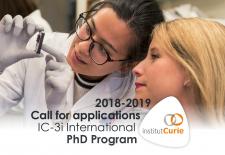Current call
5 positions in Institut Curie’s research labs are currently available for the 2019 call for applications at Institut Curie in the frame of the International PhD program.
Applications can be submitted via the online application portal until February 6th 2019, 5:00pm CET (GMT +1).
List of PhD projects
|
1. The geometry of developmental time – Dissecting temporal cell-fate acquisition during C. elegans development
Wolfgang Keil / Axel Buguin
Research group: Quantitative Developmental Biology
Keywords: lncRNA, epigenetics, single-cell, transcription, cancer
|
Project 1 |
|
2. Long noncoding RNAs as master regulators of intratumoral heterogeneity and tumor progression
Antonin Morillon / Marina Pinskaya
Research group : Non Coding RNA, Epigenetic and Genome Fluidity
Keywords: lncRNA, epigenetics, single-cell, transcription, cancer
|
Project 2 |
|
3. Control of cell emigration in development and cancer: from single cell to integrated in vivo level
Anne-Helene Monsoro-Burq / Leon Peshkin
Research group: Signaling and Neural Crest Development
Keywords: Single cell transcriptomics, Single cell imaging, epithelium-to-mesenchyme transition, metastasis, cell migration
|
Project 3 |
|
4. Imaging at the single molecule level of nuclear organization and genome stability in quiescent cells
Judith Miné-Hattab / Angela Taddei
Research group: Compartmentalization and Dynamics of Nuclear Functions
Keywords: Nuclear organization, Genome stability, quiescence, Photo Activable Localization Microscopy (PALM), Single particle tracking (SPT)
|
Project 4 |
|
5. The tubulin code as a new therapeutic target - from single molecules to organisms
Carsten Janke / Magda Magiera
Research group: Regulation of microtubule dynamics and functions
Keywords: Microtubule cytoskeleton, tubulin code, tubulin glutamylation, organelle transport, neurodegeration
|
Project 5 |
If you are interested in working with research teams at Institut Curie that are not listed above, please contact us. We will be happy to help you exploring other options to join Institut Curie.
Applicants' guide
Download the Applicant's guide here
Eligibility criteria
Entirely organized in English, this program is aimed at:
- students with (or about to obtain) a Master’s degree, or with a university degree equivalent to a European master’s degree (five-year duration),
- who have obtained their Master's degree no later than 2 years ago,
- who have not studied, worked or lived in France for more than 12 months during the three years prior to the end of the call for applications.
Calendar & steps
| Jan. - Feb. 2019 |
Call for applications |
| February 2019 |
Eligibility check of applications - results mid-March |
| April 2019 |
First selection round: evaluation of applications - results mid-April |
| May 15 - 17 2019 |
Second selection round: interviews held at Institut Curie - results beginning of June |
| Oct. 2019 |
Start of 3-year working contract |
Application
Applicants will have to complete an online application form in English when the call for applications is open. Incomplete applications will not be eligible. No application will be accepted after the deadline: February 6, 2019 at 5:00PM CET (GMT +1).
Applicants may apply for one thesis project via the online application system. The following documents are required:
- A CV
- A motivation letter
- A copy of the applicant’s high school degree
- A copy of the applicant’s master’s degree or equivalent five-year university degree (translated by the applicant into English)
- A copy of the university grade transcript from the master’s degree or equivalent five-year university degree (translated by the applicant into English)
- Two recommendation letters. Referees need to have submitted their recommendation letters by the end of the call for applications. We strongly advise applicants to contact their referees as soon as possible so that they have enough time to upload the recommendation letter online. It is the applicant's responsibility to ensure that the two recommendation letters are sent before the end of the call for applications.
Recruitment process
Eligibility check
At the end of the call for applications, applicants will be informed of their eligibility via email. Eligible applicants will go through the first selection round.
First selection round
A review committee composed of scientists from Institut Curie and experts from partner universities and organizations will rank the applications. For each PhD thesis project, applicants will be ranked and either shortlisted, put on a waiting list, or not selected.
Shortlisted candidates will be invited for the second selection round.
International applicants wishing to apply for the IC-3i PhD Program should inquire about the visa procedure regarding their country, in preparation for the interview session in Paris.
Second selection round - Selection Committee interview session
All shortlisted candidates will be interviewed by the Selection Committee during a three-day visit at Institut Curie in Paris on May 15-17, 2019.
They will visit the host laboratory, Institut Curie’s campus, the Curie museum and Institut Curie’s technology platforms. Institut Curie will provide accommodation, food and reimburse travel expenses (economy fare).
Feedback and redress process
Within a week of disclosure of the results (eligibility, first and second selection round), applicants can appeal the decision by contacting ic3iphd [at] curie.fr (ic3iphd[at]curie[dot]fr).
Evaluation criteria
Applicants will be evaluated by the review committee on three main criteria. Reviewers will evaluate the extent to which the application meets the criteria by using a scale from 0 = Fail to 10 = Outstanding.
| Evaluation criteria |
Weight |
|---|
|
Education
Academic experience
Academic excellence (incl. prizes, dual degree, international programs, exchange programs)
Grades
|
3/3 |
|
Professional experience
Recommendation letters
Work experience (training programs), both academic and private
Laboratory and theoretical experience
Cross-domain and international experience
|
2/3 |
|
Personal experience
Motivation letter
Knowledge of English
Volunteering or community service
Openness and creativity
|
2/3 |

